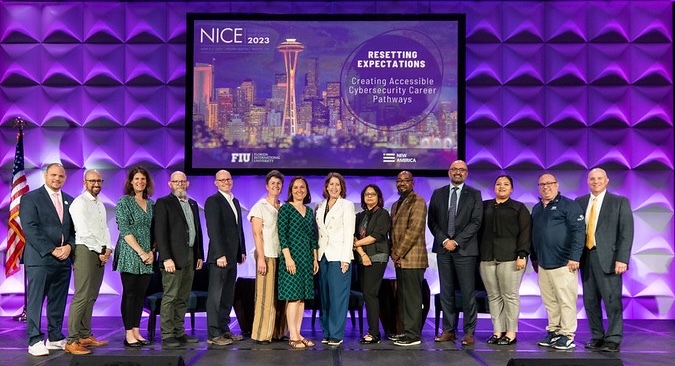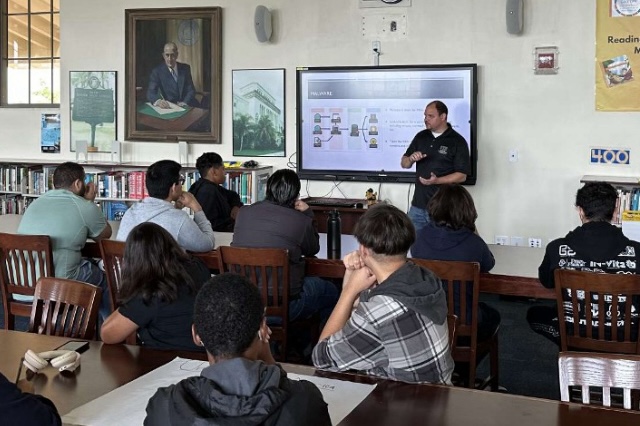PIT in Practice: Florida International University
Growing Public Interest Tech & Cybersecurity
When Randy Pestana became the Public Interest Technology University Network (PIT-UN) designee for Florida International University in 2020, he did not see himself as a public interest technologist. A former military officer, Pestana had worked at FIU as a policy analyst and in 2015 followed his boss Brian Fonseca to the Jack D. Gordon Institute for Public Policy, a think tank within the university named for the late civil rights champion and Florida state senator.
"A lot of what we do with students involves breaking down their misinterpretation of ‘I’m not technical, I don’t code, so I can’t do cyber.’”
Randy Pestana, Gordon Institute Director of Cybersecurity Programs
As Fonseca and Pestana developed programs for the institute, they looked for areas of overlap between their own backgrounds in military service and national security studies, and the institute’s history as a center for public policy and civil rights. The field of cybersecurity quickly rose to the top of the list.
Cyberattacks are an ever-growing threat to national security, and yet millions of cybersecurity jobs go unfilled every year; as in many technology fields, diversity remains alarmingly low. A 2021 study showed that despite making up 18% of the working age U.S. population, Hispanics comprise just 7% of the cybersecurity workforce. For the Gordon Institute — housed in a public university that is the nation’s latest Hispanic-Serving Institution (HSI) — cybersecurity was a promising area of impact.
Gordon Institute Director Brian Fonseca and FIU students discuss the power of cybersecurity training.
In 2019, professors Saif Ishoof, Cristina Rodriguez-Acosta, and Caryn Lavernia created the Foundations of Cyber Operations Student Development Badge with the support of a PIT-UN Challenge Grant. The experiential learning program, developed in partnership with the MITRE Corporation, offers students from any major an accessible entry point to the field of cybersecurity. The program includes practicum experience with local government, workforce boards, and private enterprise.
Pestana credits his PIT-UN predecessors at FIU with laying a strong public interest technology foundation for his work as the Gordon Institute’s director of cybersecurity programs. It all starts with accessibility, he says. “A lot of what we do with students involves breaking down their misinterpretation of ‘I’m not technical, I don’t code, so I can’t do cyber.’”
What is Public Interest Technology?
5 Keys to Institutionalizing PIT
What is PIT-UN?
Leaning Into Strengths & Relationships
Public interest technology is, by definition, a broad set of practices that brings together technical expertise with an understanding of technology’s impacts, and an emphasis on centering the needs of communities typically left out of technology design. The Gordon Institute’s approach to public interest technology has been shaped by two of its strengths: international training and network building.
As Pestana says, “We realized we weren’t going to be thought leaders in cybersecurity, at least early on. We weren’t PhDs, and we weren’t technical. But we were good at building networks, bringing people together, and offering hands-on training.” Through connections in Latin America, Pestana and his colleagues worked with the Organization of American States to develop cybersecurity training for public officials in Colombia, the Dominican Republic, Ecuador, Miami, and Peru. The program has helped hundreds of public administrators understand current and emerging threats, apply risk management frameworks, and implement strategies to prevent, deter, and respond to cyber threats. This initiative, like others offered through the Gordon Institute, underscores the critical importance of cybersecurity readiness as an essential public interest issue, one that has an impact on communities and everyday people by safeguarding their digital assets, privacy, and safety in an increasingly interconnected environment.
"Our team now understands that each person with access to the network is a major stakeholder in keeping the city cyber safe."
Ron McKenzie, Chief Information Officer, City of Deerfield Beach
In 2017, Pestana’s team won a grant to host the annual National Initiative for Cybersecurity Education (NICE) conference, a relationship that has recently been extended through 2028. Hosting the conference has allowed FIU to develop relationships with cybersecurity experts from around the world while bolstering the Gordon Institute’s own credentials in the field.

Rodney Petersen, director of NICE, which is part of the National Institute of Standards and Technology, credits FIU with attracting and engaging new stakeholders from industry, academia, and civil society. “FIU has been very effective in extending the reach of the NICE conference to include stakeholders from industry, nonprofit organizations, and civil society,” he said. “FIU’s existing engagements in Latin America, the Caribbean, and beyond have brought new audiences to the annual conference.”
To develop the Gordon Institute’s own cyber training programs, Pestana leaned into his team’s military background. With support from a grant from the National Centers of Academic Excellence in Cybersecurity (NCAE-C), the team developed the Veterans and First Responders Training Initiative, which has brought over 1,000 learners through self-paced online and in-person courses and boot camps on the foundations of cybersecurity, digital forensics, and more.
Those who want to pursue more advanced training after initial exposure to cybersecurity can apply for a yearlong, non-degree-seeking Cyber Threat Intelligence (CTI) Fellowship that includes preparation for CompTIA A+, Network+, and Security+ exam certifications, and job skills workshops on such topics as resume writing, public speaking, and scenario-based interviewing.

“My CTI Fellowship experience has broadened my professional horizons, leading to four internships in one academic year, including placements at the city of Coral Gables and MITRE Corporation,” says one former fellow. “I’m thankful for the diverse connections forged through this program, making it a pivotal step in shaping my future career.”
Cyber Upskilling for Public Administrators
In 2022, Florida passed legislation requiring municipalities to train employees in cybersecurity and to implement cybersecurity standards. NCAE-C colleagues from the University of West Florida reached out to the Gordon Institute and encouraged Pestana and his team to adapt their training for local municipalities. The Gordon Institute’s CyberSecureFlorida program now offers in-person, virtual, and on-site group training for local government offices and has trained 513 employees across 31 offered training sessions.
“Our team now understands that each person with access to the network is a major stakeholder in keeping the city cyber safe,” Ron McKenzie, chief information officer City of Deerfield Beach, said after taking the course.
“This has helped us get buy-in and support as we issue and administer new policies and advocate for additional security purchases.”
Gordon Institute Director Brian Fonseca and FIU students discuss the power of cybersecurity training.
Subscribe to the PIT UNiverse Newsletter
The Power of Relationships
The opportunity to train hundreds of municipal employees across Florida is not something that Pestana set out to find when he started his journey in public interest technology. He credits relationships for the Gordon Institute’s success in cyber more than his own ingenuity.
“Build relationships, not contacts."
Randy Pestana

“Oftentimes, we’re caught up with adding more folks on LinkedIn or having the contacts for funding sources. But when you build genuine relationships with people — especially organizations and individuals who have similar ethos as you — what I’ve found is that the collaborations, funding, and everything else will come from that.”
True to his military roots, Pestana carries with him a list of phrases that embody his core values, and he uses them as often as possible in conversation with colleagues. At the top of that list: “build relationships, not contacts.”
Related Posts
Both K-12 public schools and cyber clinics instill local pride and promote the value of community service.
Tips for reaching more diverse student populations to set them on track for careers in cybersecurity.
We must learn to value flexible, human-mediated processes, rather than rigid systems and magic bullet products.



